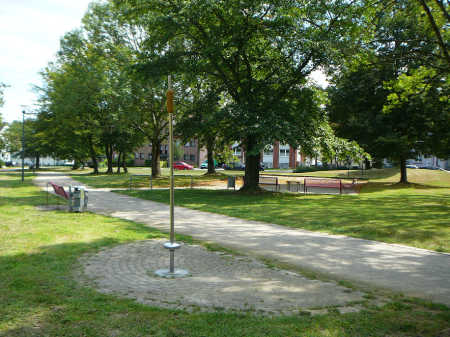
Area characterisation:
Gustav-Heinemann-Park is centrally located in Dortmund´s district of Huckarde and owned by the City of Dortmund.
In the western part a brick manufacture was operating between 1900 and 1925. Until the end of the 1960´s, all buildings were deconstructed, and the park area was partly filled with material from the brick manufacture and mine dump. The park was designed and realized in the 1980´s. Today, the park has vast extensively maintained grass areas as well as a large, old tree population. At three sides housing areas are next to the park. To the North a comprehensive school is bordering.
The 4 hectares park has a West-East extension. On the one hand, it serves as a transition space between the residential settlement of Huckarde and the Gustav-Heinemann-School respectively the regional suburban train station in the West. On the other hand, the park offers some devices for stopovers: a playground for small kids, play devices for children, table tennis, a boule facility, and many benches and stones as sitting devices. Nevertheless, only few people visit the park as a destination to spend time there.
The area for the exercise park consists of three smaller areas, each about 200 m² large. Two are next to footpaths and without trees. The unused boules lane will be deconstructed and become a place for sports devices.
Objective:
Installation of sport and exercise devices in the Eastern part of an open public park (Gustav-Heinemann-Park) in Dortmund’s district Huckarde which will be mainly useable for Huckarde citizens and pupils from an adjacent school. Devices will be publicly accessible and shall invite every person who would like to use them. Target groups are teenagers and adults, difficulty levels will range will from easy to sportive.
By installing the devices it is as well intended to increase attractiveness of the park and to create a location to spend more time; currently it is mainly a passing-by-area.
Financing:
120.000 Euros from EU project proGIreg, 40.000 Euros from City of Dortmund
Potential impacts/benefits:
The overall idea is to offer opportunities to stimulate physical exercises as prophylaxis and as an adjustment to mainly sitting activities during daily routine thus improving overall health conditions of the users.
Actions:
-
After identifying the three areas for the devices additional information was gathered about the site (e.g. soil quality, analysis of park users) and about other urban plans for Huckarde in order to work out win-win-situations for all partners involved.
-
The overall idea of the exercise park was presented to political leaders of the Huckarde district in order to gain political support for the project.
-
Before planning details a workshop was held with multipliers (due to Corona only 20 representatives of Huckarde clubs, sport clubs, political parties, and the school were invited). At first, an external planning expert for exercise parks was presenting a vast range of options. Later, the multipliers gave aspects for the design of the exercise park which were important to them.
-
A draft plan was worked out regarding the input from the multipliers. It served as a basis for a paper in order to gain political approval from the local parliament in Huckarde (session will be in September 2021).
-
Next steps will be to work out a functional bid in order to get design plans from companies. A jury with a majority of Huckarde politicians will choose the design which will be realized regarding qualitative aspects which will be published in the functional bidding paper.
Transferability of result:
The overall idea of the exercise park has a high degree of transferability and is – at least in Germany – currently very popular. Especially during Corona lockdowns public opportunities to exercise gained more attention as they increase quality of life.
The planning and political approval processes are closely related to formal working procedures within the City of Dortmund and local political bodies. These procedures always have to be adopted to respective local settings.
The involvement of local citizens during the design phase should be stronger, but in our case due to Corona turned out limited within our planning phase.
Soil aspects need special attention in areas with polluted soil. They might be very costly as soil exchange might burn a considerable amount of the overall budget. To avoid this less or not polluted locations might be chosen, if possible.
Lessons learnt:
Preparing working steps from scratch – identify a location, set up a working group, work out the project structure, get familiar with legal requirements and necessary procedures, include citizens/ multipliers into the planning phase, order soil analysis, convince political bodies about the project – takes a considerable amount of time; in our case more than 18 months. During this time work mainly took place invisibly “behind the scenes” in order to enable the project. If realization time for comparable projects is limited it might be helpful to start with an already existing project idea and a selected location rather than from scratch.
Especially political approval and bidding procedures for construction projects are formally regulated and have to meet given rules within German communities. It is very helpful to know these procedures, time limits and persons involved well ahead. Working out a project structure during the preparation phase is helpful to pattern the following working process and crucial for project success.
Client:
City of Dortmund, Department of Urban Renewal
Design team:
Design ideas: City of Dortmund (Department of Urban Renewal in cooperation with Department of Green Spaces)
Design Plan: External company
Contacts:
City of Dortmund, proGIreg@stadtdo.de
City of Dortmund, Department of Urban Renewal
NBS goals:
- Enhancing sustainable urbanization
- Restoring ecosystems and their functions
- Developing climate change mitigation
- Urban regeneration through nature-based solutions
- Nature-based solutions and the insurance value of ecosystems
NBS benefits:
- Greater ecological connectivity across urban regenerated sites
- Improve connectivity and functionality of green and blue infrastructures
- Increase achievements of biodiversity targets
- Increase Biodiversity